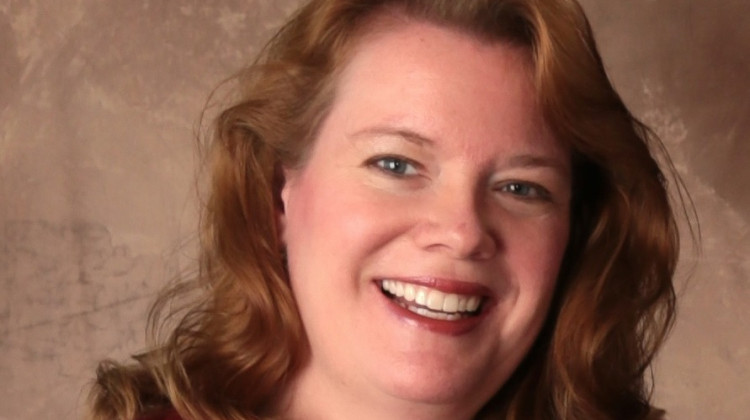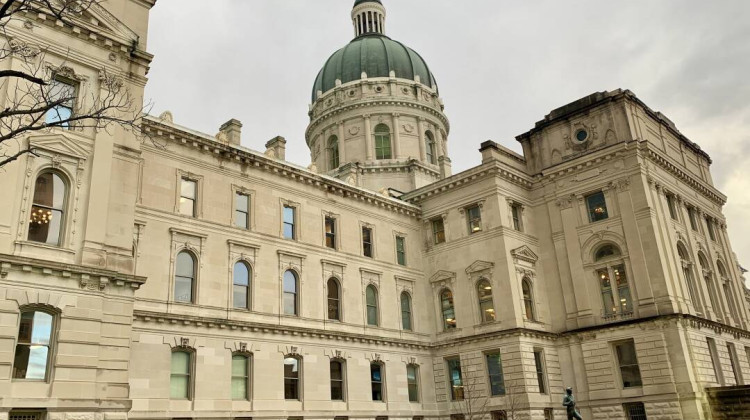A Statehouse rally organized by opponents of the Religious Freedom Restoration Act, signed into law this week by Gov. Mike Pence, drew an estimated 3,000 people Saturday.
Meanwhile the economic fallout from the new law continued to grow as Angie's List CEO Bill Oesterle said Saturday that the Indy-based company would put its planned $40 million expansion on hold until the implications of the new law were clearer. The company had been planning to add about 1,000 jobs and redevelop on the eastside site of a former Ford plant.
"Angie's List is open to all and discriminates against none and we are hugely disappointed in what this bill represents," Oesterle said.
The CEO of Salesforce, a software company with operations in Indianapolis, changed his mind about expanding in Indiana, and said his company would no longer send employees or customers to Indiana.
The measure, which takes effect in July, prohibits state laws that "substantially burden" a person's ability to follow his or her religious beliefs. The definition of "person" includes religious institutions, businesses and associations. Supporters of the bill say concerns about discrimination are overblown, and that it was necessary to protect people from being forced to act against their religious beliefs.
Speaker after speaker at Saturday's rally called out the lawmakers who backed RFRA, and also tried to counter the bad PR that Indiana -- and particularly its capital city -- have been getting in the press and on social media.
City-County Councilor Zach Adamson, a Democrat, told the crowd the new law is a “slap in the face” to the idea of Hoosier Hospitality.
“This so-called Religious Freedom Restoration Act has nothing to do with religion, and it has nothing to do with freedom,” Adamson said. “It does, however, have everything to do with blatant discrimination, and it paints a picture of Indiana that is mean and ugly and puts all Hoosiers at risk, not just the LGBT community. This is not 1915 Alabama, this is 2015 Indiana, and I’m here to say that this law is not welcome here.”
Chris Gahl, vice president of Visit Indy, said that as of Saturday afternoon, his group had tracked about 1,700 mentions of the city as an "unwelcoming place" on account of the law. Anticipating the kind of negative publicity that's swelled over the city in recent days,Gahl's organization took the unusual step of opposing RFRA from the beginning.
“Our major concern was exactly what’s happening now, though candidly not to this level," Gahl said. "When you’re in the business of marketing a city, it’s not something you want to go through."
Republican Denise Moe says she's read the new law, and that it doesn't differ much from the federal law, passed in 1993, or from those enacted in other states.
"But at this point it doesn't matter. What matters is perception. The perception of this bill and the perception of Indiana being an unwelcoming state – that’s already done," Moe said.
Adamson is a co-sponsor of a City County Council special resolution opposing the act and encouraging state legislators to amend the Civil Rights section of the Indiana code. It also calls on the legislature to protect local anti-discrimination ordinances by exempting them from the law. The council will consider the resolution at its meeting Monday night.
Adamson said he expects the resolution to have strong support among council members. Mayor Greg Ballard, a Republican, has also spoken out against RFRA.
The heat spread quickly across social media and to the White House Friday as many local officials and business groups around the state tried to jump in and stem the fallout.
Use of the hashtag #boycottindiana spread across Twitter, spurred on by activists such as "Star Trek" actor George Takei, who argued that the measure opens the door to legalized discrimination against gay people. Apple CEO Tim Cook also tweeted his objections, saying he was "deeply disappointed" in the Indiana law.
Read the full text of the bill.
Some national gay-rights groups say lawmakers in Indiana and about a dozen other states proposed such bills this year as a way to essentially grant a state-sanctioned waiver for discrimination as the nation's highest court prepares to mull the gay marriage question.
White House press secretary Josh Earnest on Friday noted the negative reaction to the Indiana law from many businesses and organizations around the country.
"The signing of this bill doesn't seem like it's a step in the direction of equality and justice and liberty for all Americans," he said.
The Arkansas Senate approved a similar proposal on Friday despite opposition from home-state retail giant Wal-Mart. Another measure stalled Thursday in the Georgia Legislature after opponents cited the fallout over the Indiana law.
Ballard said he and other city officials would be talking to many businesses and convention planners to counter the uproar the law has caused.
"I'm more concerned about making sure that everyone knows they can come in here and feel welcome," Ballard said. "That's what I'm mostly concerned about."
Groups such as the Indiana Chamber of Commerce have taken to social media with messages that the state is full of welcoming businesses. Democratic South Bend Mayor Pete Buttigieg touted on Twitter his city's civil rights ordinance's protections for gays and lesbians, while Republican Evansville Mayor Lloyd Winnecke wrote that the law "sends the wrong message about Indiana."
John Boyd, principal of The Boyd Company, a corporate site selection firm based in New Jersey, predicted short-term fallout from passage of the law, saying that it might make it more difficult for Indiana to attract new businesses, particularly technology companies.
"Companies want to be in markets that are attractive to Millennials," Boyd said. "And this type of anti-business social policy is a real challenge for the state, and will present some obstacles."
Stickers touting "This business serves everyone" have been appearing on business windows in many Indiana cities.
Pence, after signing the bill Thursday, said opponents had been mischaracterizing the measure and that it was solely a limit on government restricting people's religious liberties.
Last year, Mississippi enacted a religious objection law just weeks after Arizona Gov. Jan Brewer, a Republican, vetoed a similar effort there amid criticism from major corporations. Mississippi hasn't had any high-profile instances of the law being used by businesses to deny goods or services to gays.
Indiana University law professor Daniel Conkle, who testified in favor of the bill in Indiana legislative committees, said he was a supporter of gay rights and that the predictions of negative implications from the law were unjustified.
Conkle, who has written extensively on religious legal issues, said he didn't know of any cases under the similar state laws or the federal statute, which dates to 1993, where a court had sided with a religious objector in a discrimination case.
"This 'license-to-discriminate' argument that seems to have this relentless repetition is just legally wrong," Conkle said Friday. "It is as if you just keep repeating something often enough it takes on a life of its own."
Other legal scholars disagree with Conkle about the necessity of such legislation. In a letter to Democratic Rep. Ed DeLaney, they suggested that the law was "a solution in search of a problem," and that its passage would lead to "confusion, conflict, and a wave of litigation."
Gahl said the tourism agency was pointing out to convention planners that cities such as Chicago, New Orleans and St. Louis are in states that already have such religious objections laws.
That's part of protecting city's tourism and convention business, which is estimated to have a $4.4 billion annual economic impact with some 75,000 jobs.
"We know that their ability to work is largely dependent on our ability to score convention business and draw in events and visitors," Gahl said.
Gahl said that officials from Visit Indy and several other groups, including the Indiana Sports Corp., Downtown Indy and the Indy Chamber met with Pence yesterday to spell out their concerns about the law's impact on Indiana's reputation as a welcoming, open place.
 DONATE
DONATE






 View More Articles
View More Articles



 Support WFYI. We can't do it without you.
Support WFYI. We can't do it without you.